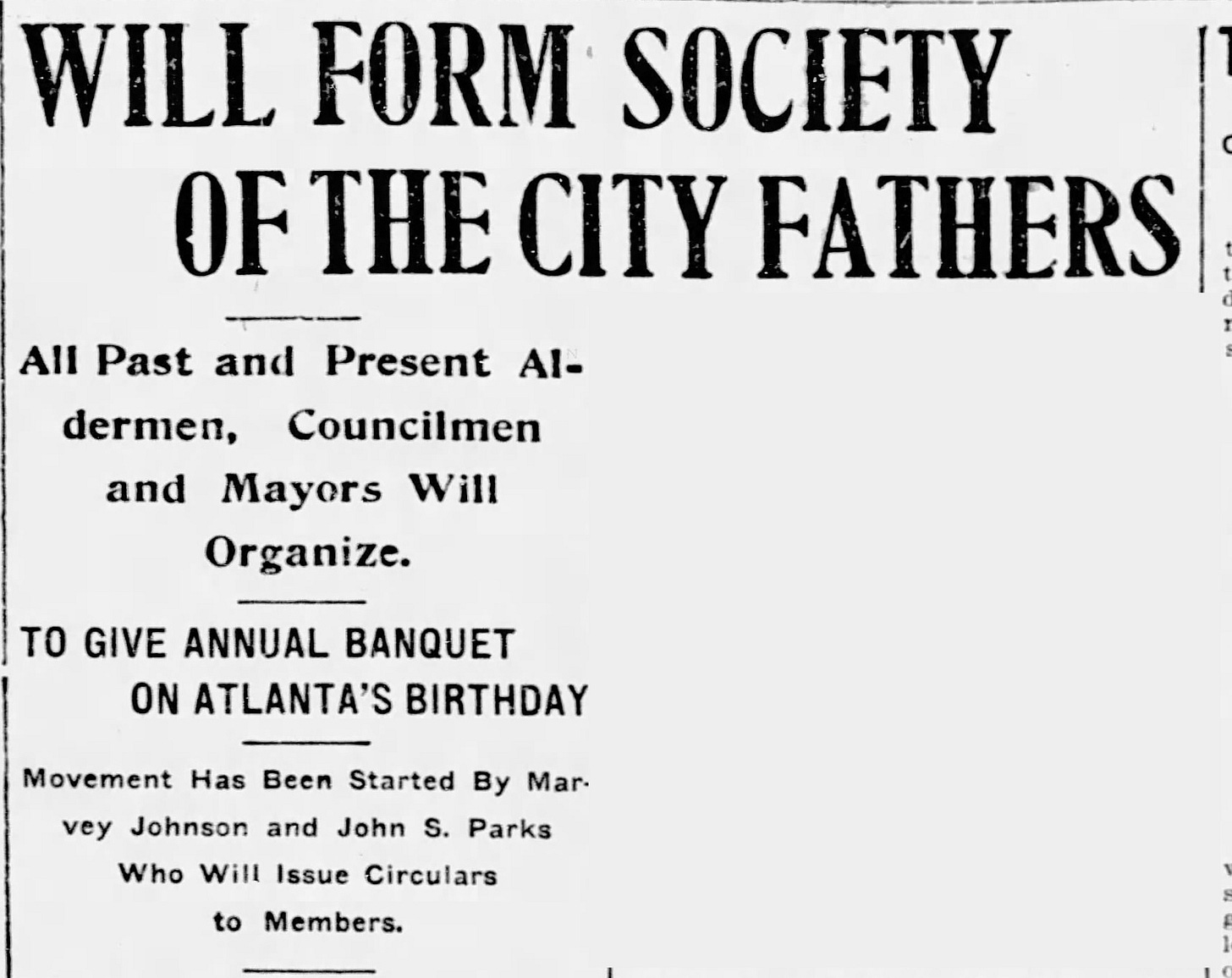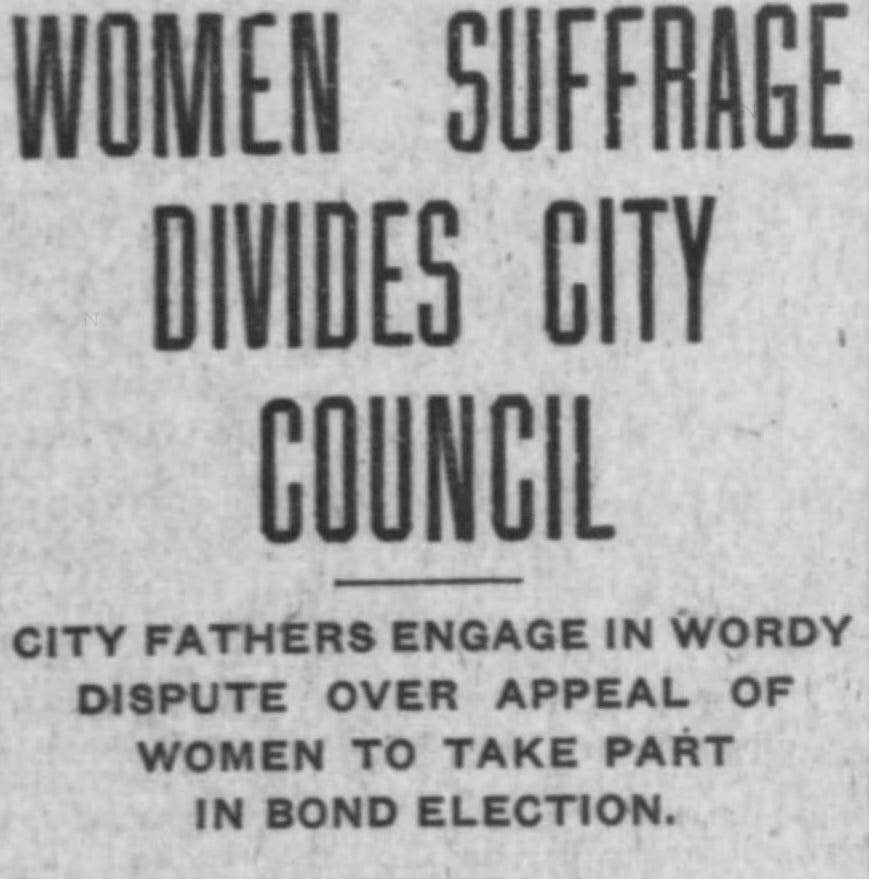I’ve been writing this series William Finch & Daffodils for almost a year now, and I’m trying to wrap it up with a couple of last installments. If you’re new to this topic, William Finch was a formerly enslaved man who was elected to the Atlanta City Council in 1870. He served one term, and afterward, there wouldn’t be another Black person elected to a city office in Atlanta until 1953.
I started with the intention of examining how I, as a white writer and tour guide, share stories about Black history. I’ve worried that if I focus too narrowly on how Black leaders like Finch challenged white supremacy I might be failing to convey their complexity as individuals. Just as stories designed to support the myth of the loyal slave, like that of Bill Yopp, were shaped to meet the demands of white audiences in the Jim Crow era, I’ve asked whether stories of Black resistance today are catering to the tastes of white liberal audiences. I’ve questioned why these stories are being told relative to white people to begin with.
The political climate in the US looks a lot differently now than it did a year ago. Diversity has gone from something that was celebrated by political leaders to a concept that’s being demonized along with equity and inclusion.
Identity Months Dead at DoD
On January 31, 2025, Secretary of Defense Pete Hegseth issued a statement titled, “Identity Months Dead at DOD.” In it, Hegseth advised that “DoD Components and Military Departments will not use official resources, to include man-hours, to host celebrations or events related to cultural awareness months, including National African American/Black History Month, Women’s History Month, Asian American and Pacific Islander Heritage Month, Pride Month, National Hispanic Heritage Month, National Disability Employment Awareness Month, and National American Indian Heritage Month.”
As a result of this guidance, a parade planned to celebrate Frederick Douglass in his Maryland hometown was canceled this past week. The parade was part of a Black History Month event, and thus, both the Maryland National Guard and the Massachusetts State Guard, who’d planned to represent the 54th Massachusetts Infantry, could not support the parade.
The Society of City Fathers
I was doing research for another post about William Finch when I came across an article about the formation of the Society of City Fathers, a social organization for former city council members. This article appeared in the The Atlanta Journal March 5, 1902:
1902 would have been roughly thirty years after Finch served on the city council, and about fifty years before another Black person would be elected to city office. Even though a lot of efforts were made during this era to disenfranchise Black voters (e.g., poll taxes and white only primaries), the article indicated that Finch would be part of the Society of City Fathers:
“Finch will be admitted to membership in the society and will attend the annual banquet, which will be an innovation in customs here. When he goes to the first banquet it is probable that the occasion will be the first upon which an organization of southern gentlemen will have sat willingly at a table with a negro, recognizing him as a member of their party. It has already been determined, however, that Finch is to be a member of the society, as he was a bone fide member of the city council. Those who are organizing the society believe that the effect of preventing Finch from joining will be to weaken the organization.”
I tried to search more for mentions of this Society of City Fathers in the newspaper to see if there was any reporting on this banquet, but I wasn’t able to find anything. It turns out, the term “City Fathers” was used often in the paper to refer to the city council.
City Fathers on Women’s Suffrage
In 1902, the same year the Society of City Fathers was being formed, the Georgia Woman Suffrage Association appealed to the city council in Atlanta to be allowed to vote in an election about sewer and water bonds.
Some of the council members, including Mayor Mims and Councilman Reid, expressed support for women’s suffrage.
“‘I am in favor of suffrage,’ [Councilman Reid] said. ‘Most of the enlightened countries of the world allow women not only to vote, but to hold political positions. This is the time for this council to ask the state legislature to make such charter amendments as will permit their voting on such questions.’” -Atlanta Semi-Weekly Journal, December 18, 1902, p. 3.
This statement made me curious about when Georgia ratified the 19th Amendment, which gave women the right to vote. The answer is complicated.
On July 24, 1919, Georgia was the first state to reject the 19th Amendment. The 19th Amendment passed after it was ratified by the 36th state to vote for it, Tennessee, on August 18, 1920. This meant women in most states were allowed to vote in the 1920 election, but not in Georgia, where voters had to register six months before an election. Eventually, Georgia did pass the 19th Amendment on February 20, 1970.1
Immutable Characteristics
The Department of Defense guidance about no longer recognizing identity months ends with this statement:
“Installations, units, and offices are encouraged to celebrate the valor and success of military heroes of all races, genders, and backgrounds as we restore our warrior culture and ethos. We are proud of our warriors and their history, but we will focus on the character of their service instead of their immutable characteristics.”
Can the “character of their service” be separated from “immutable characteristics” when for much of United States history certain “immutable characteristics” were prerequisites for being allowed serve? Frederick Douglass’s leadership in the Civil War isn’t being celebrated with a parade supported by military units because his legacy is entwined with his “immutable characteristic” of being Black, but Abraham Lincoln was only able to lead the country during the Civil War because he had the “immutable characteristic” of being white.
Identity months have been a way for us to honor the legacy of individuals whose contributions have been overlooked because they did not meet the default “immutable characteristics” for access to power in the United States. I fear that discontinuing the recognition of these diverse contributions will, in the words of the City Fathers, “weaken the organization.”
The Daffodils
Last year around this time, I visited the Spring Bulb Show at the Lyman Conservatory on the Smith College campus. I can’t wait to return soon to see these beauties (or perhaps their descendants):




Georgia and the 19th Amendment. National Park Service. https://www.nps.gov/articles/georgia-and-the-19th-amendment.htm








Beautiful pictures! So sad, it makes you not trust in anything after this when you realize how easily people will flip and not support what is right.